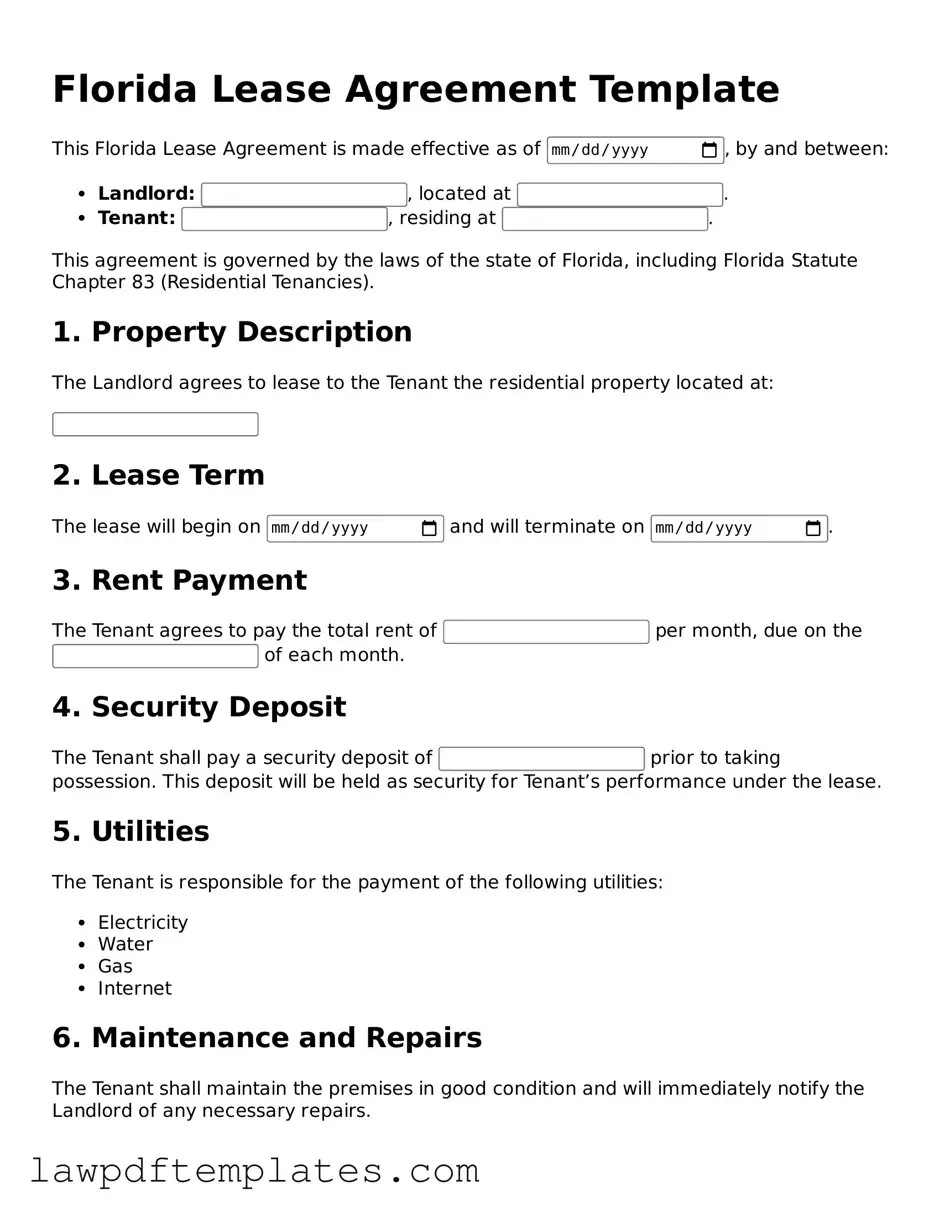Free Lease Agreement Template for the State of Florida
Form Breakdown
| Fact Name | Description |
|---|---|
| Governing Law | The Florida Lease Agreement is governed by Florida Statutes Chapter 83. |
| Types of Leases | This form can be used for residential, commercial, and agricultural leases. |
| Duration | The lease term can be specified as a fixed term or month-to-month. |
| Security Deposit | Landlords may require a security deposit, which must be returned under certain conditions. |
| Rent Payment | The agreement outlines the rent amount, due date, and acceptable payment methods. |
| Maintenance Responsibilities | Both landlords and tenants have specific responsibilities for property maintenance. |
| Termination Notice | Notice requirements for lease termination vary based on the lease type. |
| Default Clauses | Provisions for handling defaults by either party are included in the agreement. |
| Dispute Resolution | The lease may include clauses for mediation or arbitration in case of disputes. |
Sample - Florida Lease Agreement Form
Florida Lease Agreement Template
This Florida Lease Agreement is made effective as of , by and between:
- Landlord: , located at .
- Tenant: , residing at .
This agreement is governed by the laws of the state of Florida, including Florida Statute Chapter 83 (Residential Tenancies).
1. Property Description
The Landlord agrees to lease to the Tenant the residential property located at:
2. Lease Term
The lease will begin on and will terminate on .
3. Rent Payment
The Tenant agrees to pay the total rent of per month, due on the of each month.
4. Security Deposit
The Tenant shall pay a security deposit of prior to taking possession. This deposit will be held as security for Tenant’s performance under the lease.
5. Utilities
The Tenant is responsible for the payment of the following utilities:
- Electricity
- Water
- Gas
- Internet
6. Maintenance and Repairs
The Tenant shall maintain the premises in good condition and will immediately notify the Landlord of any necessary repairs.
7. Termination
Either party may terminate this lease in accordance with Florida law, providing the required notice period:
- 7 days for non-payment of rent.
- 15 days for lease violations.
8. Governing Law
This agreement will be governed by the laws of the state of Florida.
9. Signatures
By signing below, both parties agree to the terms outlined in this Lease Agreement:
- Landlord Signature: ___________________________ Date: ______________
- Tenant Signature: ___________________________ Date: ______________
Ensure all parties have read and understood this agreement before signing. It is highly advisable to keep copies for both the Landlord and Tenant.
Common mistakes
When filling out the Florida Lease Agreement form, many people overlook important details that can lead to misunderstandings or disputes later on. One common mistake is failing to include all necessary parties in the agreement. Both landlords and tenants must be clearly identified. If a tenant's spouse or roommate is not listed, it could create complications regarding responsibilities and rights under the lease.
Another frequent error involves the lease term. Some individuals neglect to specify the start and end dates of the lease. This omission can lead to confusion about when the tenant is expected to move in or out. A clear timeline helps both parties understand their obligations and can prevent potential conflicts down the road.
Additionally, many people forget to address the security deposit. The Florida Lease Agreement should clearly state the amount of the deposit, the conditions under which it will be returned, and any deductions that may apply. Without this information, tenants might be surprised by unexpected charges when they move out, while landlords could face disputes over the return of funds.
Lastly, not reviewing the lease for compliance with local laws can be a significant oversight. Florida has specific regulations regarding rental agreements, including rules about eviction notices and tenant rights. Failing to adhere to these laws can render parts of the lease unenforceable, leaving both parties vulnerable to legal challenges. It’s crucial to ensure that the lease aligns with state and local regulations to protect everyone involved.
Discover More Lease Agreement Templates for Specific States
Illinois Lease Agreement Pdf - It helps in establishing a formal relationship between the landlord and tenant.
For individuals seeking to secure their rights in legal matters, understanding the importance of a Durable Power of Attorney in Illinois can be vital to ensure that their preferences are honored in times of need.
How Do I Print a Rental Agreement - Encourages open communication regarding lease term negotiations.
